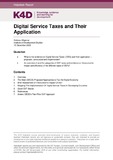| dc.contributor.author | Kelbesa, Megersa | |
| dc.date.accessioned | 2021-11-29T11:06:03Z | |
| dc.date.available | 2021-11-29T11:06:03Z | |
| dc.date.issued | 2020-12-15 | |
| dc.identifier.citation | Megersa, K. (2020). Digital Service Taxes and Their Application. K4D Helpdesk Report 914. Brighton, UK: Institute of Development Studies, DOI: 10.19088/K4D.2021.135 | en |
| dc.identifier.uri | https://opendocs.ids.ac.uk/opendocs/handle/20.500.12413/16968 | |
| dc.description.abstract | Many developing economies have seen a rise in e-commerce activity within their borders, and a decline in income from traditional industries as a result of COVID-19, meaning the digital economy offers a potentially unexploited source of tax revenue. . As a result, more developing countries may soon begin adopting some sort of digital tax.
The economic activities which may be subject to the Digital Services Tax (DST) may vary from country to country. It will, therefore, be necessary for businesses operating in multiple jurisdictions across developing countries to keep up with the changes in digital taxes.
Before implementing a DST scheme, developing countries are advised to perform an in-depth cost-benefit analysis and due considerations.
Some developing (and several developed) countries have already unilaterally implemented a “provisional” DST system. Other developing countries are on the process of implementing DST or have simply announced that they will implement a DST soon. Although most of the countries so far actively working on DST (are rich countries, a growing list of developing countries are joining the process. Some examples include the following: Malaysia, Indonesia, Kenya, Nigeria, Argentina and, Chile.
It is important to mention that the literature on DST is very limited – although growing, and the evidence base around the economic impacts is particularly scarce. This is partly due to the quite recent nature of DST implementation. The evidence is even scarcer for developing countries –
Due to these limitations, this rapid evidence review looks at different types of available literature – including reports and blogs issued by international financial institutions and development agencies.
The rest of the report will give an overview of key proposed approaches to tax the digital economy, provide a very brief account of the economic impact of DST, provide a brief mapping of the implementation of digital service taxes in developing countries, provide a brief description of each DST system and about the economic impact of the DST, finally a brief account or attributes of a “good” DST system. | en |
| dc.description.sponsorship | FCDO (Foreign, Commonwealth and Development Office) | en |
| dc.language.iso | en | en |
| dc.publisher | Institute of Development Studies | en |
| dc.relation.ispartofseries | K4D Helpdesk Report;914 | |
| dc.rights.uri | https://www.nationalarchives.gov.uk/doc/open-government-licence/version/3/ | en |
| dc.subject | Finance | en |
| dc.subject | Politics and Power | en |
| dc.subject | Technology | en |
| dc.title | Digital Service Taxes and Their Application | en |
| dc.type | Helpdesk | en |
| dc.rights.holder | © Crown copyright 2021 | en |
| dc.identifier.doi | 10.19088/K4D.2021.135 | |
| rioxxterms.funder | Default funder | en |
| rioxxterms.identifier.project | K4D | en |
| rioxxterms.version | VoR | en |
| rioxxterms.versionofrecord | 10.19088/K4D.2021.135 | en |
| rioxxterms.funder.project | 0986883a-6d0f-4bb8-9c46-5e0682934d65 | en |

